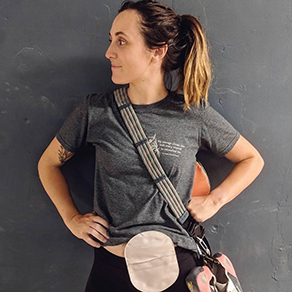Journeys of Inspiration
Written by Rolf Benirschke
McKenna Plant
 Mike Plant loved his daughter, McKenna, so fiercely that he hoped and prayed she would never have to battle IBD like he had since he was 20. Having served in Vietnam, Mike never wanted to show any weakness. The only time McKenna remembers her dad having any health issues was when she was three years old. “I have a memory of sitting at the end of his hospital bed playing video games, but I had no idea why he was there because my dad was never sick,” she recalls.
Mike Plant loved his daughter, McKenna, so fiercely that he hoped and prayed she would never have to battle IBD like he had since he was 20. Having served in Vietnam, Mike never wanted to show any weakness. The only time McKenna remembers her dad having any health issues was when she was three years old. “I have a memory of sitting at the end of his hospital bed playing video games, but I had no idea why he was there because my dad was never sick,” she recalls.
Losing Identity
McKenna loved her freshman year of high school including running on the varsity cross-country team and taking Irish dance lessons – that mesmerizing style of dance where the dancer’s feet tap out a blistering rhythm and move so rapidly, they become a blur. She was a good student with a very active social life and a great group of friends. And then, McKenna remembers, things suddenly changed. “I had just finished a great cross-country race and was shoveling a celebratory chocolate chip cookie into my mouth when I doubled over in pain,” she said. She describes going from having all the energy in the world to hardly being able to get out of bed. And so it began, the same journey that many young IBD patients endure: missing school, sneaking out of cross-country practice, avoiding friends, having a hard time eating, losing weight, severe abdominal pain and fatigue, embarrassment, and a profound fear about what was happening in her body. She describes it as one of the lowest points of her life, “I lost the two things that were my identity, running and dance, and I had no idea how I was going to survive without them.”Full Disclosure
Her parents were navigating the medical system to find answers that they undoubtedly were aware of. McKenna recalls the day her dad asked the doctor if it was possible that she had IBD due to his history of the disease. She was shocked since it was the first time she’d heard about her father’s illness. When an MRI confirmed Crohn’s disease, McKenna had no idea what it meant. She watched him nearly punch his fist through a wall at the hospital when the doctor broke the news. That event became a turning point in their relationship and her dad went from complete avoidance to full disclosure. McKenna remembers sitting at the computer together as he told her about all he had endured, “When I first became Ill, I was so sick I had to move home with my parents and lost a lot of weight. But the next year I did an Ironman.” His encouraging words of, “You’re going to be OK, kiddo,” would reverberate in her heart and her mind in the days to come.Feeling Pathetic
Being forced to give up the activities she loved and missing big chunks of school changed McKenna’s life dramatically. Desperate for her “normal” life, McKenna ran a JV cross country race going into her junior year and finished second to last. Amidst the cheers of her teammates, she wondered, “Why are you all cheering? This is pathetic, just like the rest of my life right now.” McKenna mechanically went through the motions of life as she tried all the first-line medications and was in and out of the hospital repeatedly. During one particular stay, after a colonoscopy, she collapsed into her mother’s arms due to severe intestinal bleeding and regained consciousness just as the hospital staff rushed into her room. McKenna remembers the time after “the incident,” as sobering because she began to fully comprehend how impactful this disease was going to be on her life. McKenna started her senior year weighing just 94 lbs. with what she describes as a “brutal, massive, prednisone moon face.” A teacher pulled her aside and asked, “Your face has become more inflamed and you are so skinny. What is going on with you?” Despite her appearance, steroids kept her symptoms under control. She struggled through the year, but was able to attend the prom. She was determined not to let the disease get the best of her. McKenna and her dad became involved in the Crohn’s and Colitis Foundation (CCF) through the “Take Steps” walk and did a half marathon with Team Challenge in Napa. McKenna looks back fondly on those memories now, “That was a sweet time and so powerful to do it with my dad.”College in Jeopardy
The disease continued to progress and McKenna’s plans to attend UC Berkeley were put in jeopardy. Determined not to let the disease “win,” she begged and groveled with her doctor to let her move into the dorm. Only a month into the semester, she developed fistulas and was forced to put college on hold. After a semester at home, she began a regimen of what she calls, “Rest. Recover. Remicade.” She eventually graduated with a degree in political economy. Soon after, she found the perfect job: working for the Crohn’s and Colitis Foundation in their Team Challenge department…the program that had done so much to strengthen her relationship with her dad. Unfortunately, the stress of the job and an unrelenting disease began to take its toll and McKenna found herself sitting face to face with her surgeon. When she asked for his recommendation, he answered matter-of-factly, “If I were in your position, I would opt for ostomy surgery.” McKenna remembers thinking to herself, “I know I’m not supposed to be happy about this news, but I’m so relieved that there might be a way out of this very challenging and compromised life I had been forced to live.”The Best Decision
The best decision she ever made was to attend a Crohn’s and Colitis Foundation support group where she met other people with ostomies who helped her “grieve and process” what she was about to go through. Thinking back, she remembers, “I wasn’t scared about having an ostomy but was terrified about the finality of it.” She said she never really doubted her decision in the 17 weeks leading up to her surgery as she firmly believed an ostomy could not possibly be worse than what she had been dealing with up to that point. Her “healthy” friends told her how sad and sorry they were that she was going to have an ostomy. Her response? “Listen, the only thing you should feel bad about is that I’ve had to deal with this since I was in high school. We should be celebrating!” McKenna credits her fairly smooth recovery to her independence and the supportive Crohn’s and Colitis Foundation community. She interviewed for her dream position at CCFA on the morning of her father’s funeral. She feels it was “a sign” she was where she was meant to be. She soon accepted the position with great joy and appreciation for the opportunity to work with parents, patients and physicians to help them all discover a life worth celebrating.Save 20% – Use Code: Save20
 Rolf Benirschke was the placekicker for the San Diego Chargers for 10 seasons, but his career nearly ended because of a difficult battle with ulcerative colitis. He would require ileostomy surgery but returned to play in the NFL and has been educating and encouraging ostomy patients and WOC nurses ever since. His illness led him to start his patient engagement company, Legacy Health Strategies, and author three books, including his autobiography, Alive & Kicking. He is married and the father of four children, three with special needs. www.rolfbenirschke.com.
Rolf Benirschke was the placekicker for the San Diego Chargers for 10 seasons, but his career nearly ended because of a difficult battle with ulcerative colitis. He would require ileostomy surgery but returned to play in the NFL and has been educating and encouraging ostomy patients and WOC nurses ever since. His illness led him to start his patient engagement company, Legacy Health Strategies, and author three books, including his autobiography, Alive & Kicking. He is married and the father of four children, three with special needs. www.rolfbenirschke.com.





